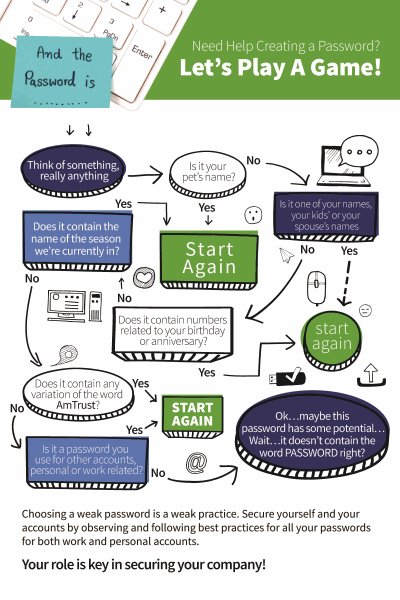5 Tips for Creating Secure Passwords
After a business has been the victim of a cybersecurity attack where critical information was accessed, there’s no doubt it can be difficult to recover. Some of the biggest corporations in the world have been victims of data breaches that have cost several millions of dollars to rectify, inlcuding companies such as Equifax, Marriott, Microsoft, Uber and more.
Small businesses may be even more at risk for a cyber attack than a large company simply to due a lack of security measures in place. Whether sensitive information was lost or the business’s reputation becomes tarnished, these cyber attacks leave a wave of destruction in their wake. It's vital to understand how to
identify a business's risk for cyber exposure, as well as how to
prepare for a data breach.
Creating a Strong Password: Security Tips and Guidelines

We rely on the internet for many things we do. With the number of cyber attacks increasing every year, cybersecurity is a major concern for businesses of all sizes. This is why it’s so vital to make a concerted effort to help manage any potential risks. And even with the latest and greatest antivirus software and the most powerful hardware firewall, a small business can easily become compromised due to the weak passwords employees use to access information.
One of the best things small businesses can do to help protect themselves from a cybersecurity attack is to understand how to make a strong password. Here are a few secure password tips to ensure business owners and their employees understand how to develop passwords that safeguard sensitive data:
Password Safety Tip #1: Don’t use the same password twice.
It’s often common for people to use the same password to log in to a variety of websites. Employees at businesses of all sizes should be encouraged to use a different password for each of their important accounts. If one website experiences a breach, the other sites using that same password are also at risk. (See tip #5 to help make this more realistic!)
Password Safety Tip #2: Use a mix of characters including letters, numbers and symbols - or a passphrase.
It’s always tempting to create a password using a loved one’s name, a pet’s name, a birthday or anniversary and so on. However, these types of passwords are generally quite easy for a hacker to figure out. Instead, passwords should be at least 12 characters long and include upper and lower case letters, numbers and symbols.
Additionally, another great strong password idea is to think of a passphrase instead of just a word. For example, four random dictionary words with spaces: Logic finite eager ratio ! This passphrase easily memorable without the need to write it down, which is a big security mistake. Five reasons why passphrases are a stronger choice for a password include:
- Passphrases are easier to remember than passwords.
- Passphrases are difficult to crack through brute force.
- Passwords are easily hacked by password-cracking tools and robots as well as by humans.
- Most major applications and operating systems allow for up to 127 characters and the use of passphrases for optimal security.
- A passphrase can easily satisfy complex rules and requirements for passwords, as most allow for punctuation, uppercase, and lowercase letters.

Password Safety Tip #3: Avoid sharing passwords.
Passwords should always be kept confidential. Users within the organization should not divulge their passwords to anyone, including other coworkers or friends. The more people who have access to a password, the more likely it is for that password to get passed on to others who may abuse it.
Password Safety Tip #4: Don’t keep passwords written down near computers.
Remembering all the different passwords for all the different systems and accounts can be difficult, and that’s why many people take to posting their passwords on a notepad or sticky note on their computer monitor. While it’s fine to write down passwords, they should never be kept out in the open where anyone can see them.
Password Safety Tip #5: Utilize a password generator or manager.
A password management service will generate secure passwords that are extremely difficult to crack. It also eliminates the need to remember multiple passwords every time a new account is opened. Password managers create a strong, reliable password every time a new account is needed on a website, storing all passwords a single location. These passwords are then accessible through one master password.

Cyber Insurance Can Protect Your Client’s Organization
AmTrust knows small business, and we recognize that you shouldn't have to be a Fortune 500 company to afford protection against cyber risk. Learn more about
Cyber Insurance policies from AmTrustCyber, which help protect small businesses from some of the costs associated with a variety of cybersecurity attacks.
Contact us today to learn more.
This material is for informational purposes only and is not legal or business advice. Neither AmTrust Financial Services, Inc. nor any of its subsidiaries or affiliates represents or warrants that the information contained herein is appropriate or suitable for any specific business or legal purpose. Readers seeking resolution of specific questions should consult their business and/or legal advisors.